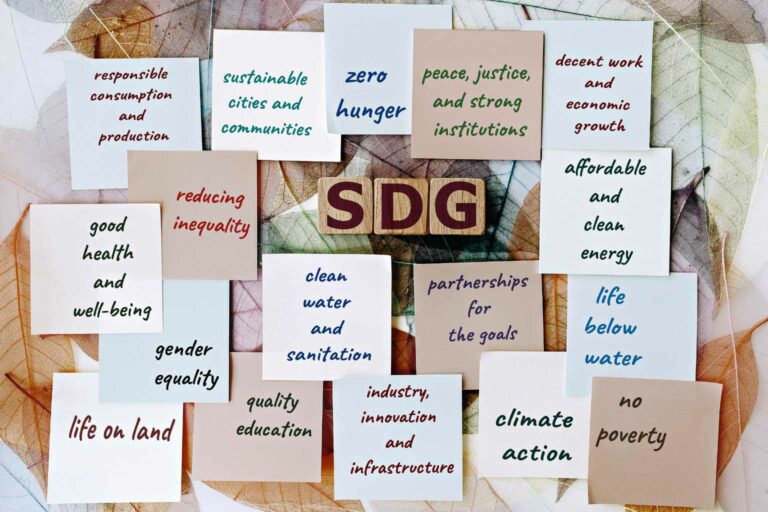
What is a Sustainability Plan: Introduction
What is a Sustainability Plan: In today’s world, the journey towards a sustainable future is a collective effort. It necessitates collaboration among individuals, communities, and businesses.
A Sustainability Plan plays a pivotal role in this shared endeavour, providing a structured approach to address environmental concerns.
At Play It Green, we recognise the significance of this joint responsibility, and we think it’s important to have a well-crafted Sustainability Plan.
So, without further ado, read on to find out what a sustainability plan is, why it’s a collaborative effort and why you should have one!
What is a Sustainability Plan: The Power of Collaboration
Collaboration amplifies our ability to effect positive change. When communities, businesses, and individuals unite, they can create a more sustainable environment.
A Sustainability Plan serves as a roadmap, guiding us on this collective journey towards a greener future. It fosters unity of purpose and encourages a sense of shared responsibility among stakeholders.
What is a Sustainability Plan: Elements to Consider
A comprehensive Sustainability Plan encompasses various facets that collectively contribute to a more sustainable and ethical business operation. It not only addresses environmental concerns but also integrates crucial social and economic considerations. These plans can address a number of the United Nations Sustainable Development goals.
Clear Objectives and Targets
Define specific, measurable goals aligned with your business’s values and environmental priorities. This ensures that efforts are focused on areas that matter most.
Efficient Resource Management
Outline strategies for the efficient use of resources, including energy, water, and raw materials. This not only reduces costs but also minimises environmental impact.
Waste Reduction and Management
Implement practices to minimise waste generation and establish recycling and disposal protocols. This contributes significantly to a more sustainable and eco-friendly operation.
Emissions Reduction Strategies
Develop strategies to lower greenhouse gas emissions. This could involve adopting cleaner technologies or implementing energy-efficient practices.

Stakeholder Engagement and Communication
Engage with stakeholders, including employees, customers, and the community, to ensure alignment and gather valuable insights. Effective communication fosters a culture of sustainability.
Promoting Good Social Practice
Living Wage Commit to paying employees a wage that meets the basic cost of living in their area. This not only provides financial stability to employees but also promotes social equity and inclusivity[1].
Equality Diversity and Inclusion (EDI) Foster an inclusive work environment where every employee is valued for their unique perspectives and contributions. This promotes creativity, innovation, and a sense of belonging within the organisation[2].
Local Community In today’s business landscape, using business as a force for good within the community it functions in, is becoming a must.
By integrating these elements into your Sustainability Plan, you’re not only addressing environmental concerns but also demonstrating a commitment to ethical and socially responsible business practices. This comprehensive approach paves the way for a more sustainable and inclusive future for all.
What is a Sustainability Plan: Benefits
Setting Clear Objectives
A well-defined Sustainability Plan outlines specific goals and objectives, providing a clear sense of direction for businesses and communities alike. This clarity empowers teams to work towards a common goal, ensuring that efforts are aligned with broader sustainability objectives[3].
Optimising Resource Utilisation
It helps in identifying areas where resources can be used more efficiently. This leads to cost savings and a reduced environmental footprint, which are crucial factors for long-term sustainability.
Building Resilience and Adaptability
A Sustainability Plan equips businesses to adapt to changing environmental conditions and regulations. This flexibility ensures the long-term viability and success of the business in an ever-evolving landscape.
Enhancing Reputation and Attracting Partnerships
Demonstrating a commitment to sustainability through a plan enhances a business’s reputation. It attracts environmentally conscious customers, employees and partners, fostering mutually beneficial relationships.
What is a Sustainability Plan: Latest Research
Recent studies show that companies with well-implemented sustainability plans tend to outperform their competitors.
They are more resilient to market fluctuations, better equipped to manage risks, and often attract a more loyal customer base.
Additionally, investors are increasingly considering a company’s sustainability efforts when making investment decisions, further emphasising the importance of having a comprehensive Sustainability Plan [4].
What is a Sustainability Plan: Final Thoughts
The framework to construct your sustainability plan would be taken out of your sustainability policy (if you have one). One aspect to be mindful of is some Sustainability Policies just cover environmental/net zero matters and others cover the wider aspects of sustainability such as EDI and any of the 17 UN SDGs. There is no right or wrong but rather a business only chooses what is relevant to them and they feel they can impact upon.
Join Us On The Journey
Play It Green is here to support you and your business on its sustainability voyage.
Along with our platform and network we can assist in measurement, frameworks, planning, action, education, and driving social impact. Most importantly, together, we can create a more sustainable future for all.
Contact us today to become part of our community and take the first step towards a greener tomorrow!
Call or WhatsApp 0161 399 0356, email info@playitgreen.com or send us a message on the website or our social media!
Better For Business, Better For People, Better For Planet.






